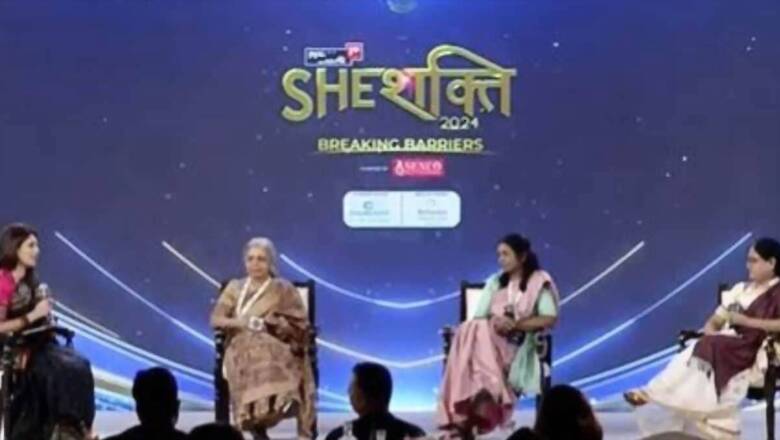
views
Do girls really have Mathematics anxiety? It seems that the fear of mathematics and physics is not gender based, but due to the “social conditioning”, many girls pull away from taking up the subjects. This was the predominant sentiment shared by three prolific women in the field of science – Dr Annapurni Subramaniam, Director, Indian Institute of Astrophysics, Nigar Shaji, Project Director, ISRO’s Aditya L1 Solar Mission and Sanghamitra Bandyopadhyay, Director, Indian Statistical Institute, at the She Shakti 2024 hosted by CNN-News18 in New Delhi on Monday.
Shaji, who is the project director at ISRO’s Aditya L1 Solar Mission, threw light on how her parents in her early adulthood played an important role in “shielding” her during her engineering days. She recalled that “those days engineering was not for girls. Most of them were becoming doctors due to stereotypes”.
She praised ISRO for giving her opportunities where she did not face “much of barriers”. Though she stressed most of the barriers are created by society so it is important that parents educated to “crush the barriers”.
Another achiever, Dr Subramaniam, director of the Indian Institute of Astrophysics, pointed out how music was an important part of her life while she was growing up. If not a scientist, she would have been a musician, Dr Subramaniam said.
“My parents are professional musicians. But I was quite fascinated by Maths and Physicsand and believed that was my calling… Music was my Plan B. I convinced myself that I can do music side by side, if I take up Maths and Science. But If I had taken up music, I could not have gone back to Science.”
if I take science and Math. Bias in the science field? When you go do bacherlors, masters, PhD, the number of women starts reducing. When you go to a hiring stage, organisations are putting a woman candidate on a par with men. At leadership positions, we as women have to convey to the younger faculty that you have to take the ladder and climb up. In the next coming decade or so, the number should increase. I want the organisation should give confidence to women employees.
Sanghamitra Bandyopadhyay, Director, Indian Statistical Institute, spoke about “Maths anxiety” among young girls. She underlined that “mathematical ability is equality distributed amongst all. It is only social conditioning, which turns away girls from it”. She pointed out that not only girls, but even boys are afraid of the subject. But more men continue to pursue Mathematics because of the social conditioning.
Explaining why she took up Mathematics and Physics during her school days, Bandyopadhyay said she was “bad in geography and biology as it required so much of memorization, whereas Maths and Physics were logical”. She said that the logical sense amongst girls is developed from a very young age, then they won’t be afraid of it.
She also told young boys and girls to keep a story in mind while studying Maths and Physics, which would help them understand the subjects. She stressed that “experiential learning in schools” will help young children understand what subjects they like and help them flourish.
With more than 42% of women enrolled in STEM in the country, only 27% of women are working in the field. When asked about the gap and the institutional changes that can be brought it, Shaji said, “We need to break the fear of STEM. It depends on one’s passion and what they want to do. It does not depend on a person’s gender. Institution-wise, we should bring awareness in schools itself. At present, we have come a long way. Many girls are taking up STEM. In engineering colleges now, girls are outnumbering boys. It is only in the leadership positions, you see fewer women due to family responsibilities. It is slowly changing.”
She also pointed out it is not the question of striking a balance between family and career, but one should “integrate family and work and give priority as and when required”.
On the implicit bias in the hiring process and peer reviews, Dr Subramaniam affirmed that it exists at different levels from graduation to the PhD. “At the hiring stage, you have to handle the family and career. Thus, achievements of a female candidate could be fewer than the male. But now the organizations are taking cognizance of this fact”.
Women who have taken up the leadership roles need to give confidence to younger women, she added. “I want the authorities to have confidence in a woman who is at par with male candidates. That really needs to happen in STEM. We need to have more people (women) to take up leadership positions in STEM”.
On gender pay gap in science and technology, Bandyopadhyay said hiring more women in the decision-making roles will make that difference go away.
In the era of Artificial Intelligence (AI) and STEM, Bandyopadhyay said, “The field is ripe for women to flourish. It is dependent on intellectual power and women are not behind”.
“The society is not fair. Women have to work much harder to reach the level of a man. We have to get into the system and maneuver it… I see many women directors in organisations. The change takes place when a woman is at a child-bearing age where she has to give up on certain responsibilities. We glorify motherhood a lot. The society has seasoned a woman in such a way that she begins to feel guilty if she leaves her baby away. Women in leadership positions mean profit”, she explained.




















Comments
0 comment